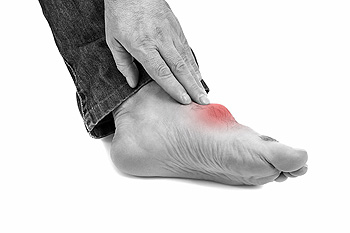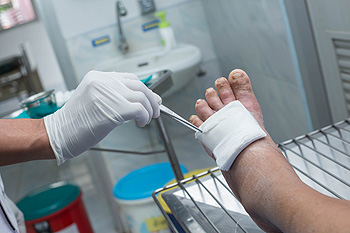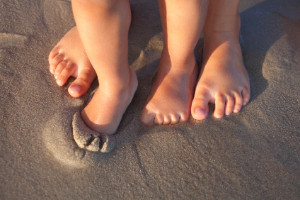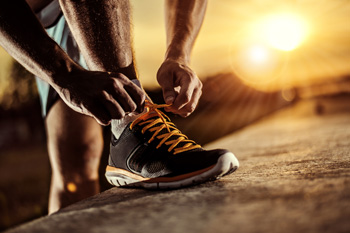Freehold (732) 294-9393
Freehold (732) 294-9393
 The medical condition that is known as gout can be uncomfortable. This form of arthritis generally causes severe pain and discomfort in the big toe and surrounding areas. The pain comes from the joints, and is caused by elevated uric acid levels in the blood. Many patients who experience gout attacks equate the pain to needle-like sensations, and it may be painful if anything touches the toe. Symptoms of this condition often include redness and swelling around the affected joints. Research has indicated that this ailment can develop from genetic traits, or from certain foods that are eaten. These can include red meat, shellfish, and drinks that have large amounts of sugar in them. A proper diagnosis can consist of having a blood test performed which may be helpful in determining the amount of uric acid that is present. Additionally, it may be beneficial to use a needle to remove a portion of the crystals from the painful joints. If you have been afflicted with gout attacks, it is suggested that you speak to a podiatrist who can properly treat this condition.
The medical condition that is known as gout can be uncomfortable. This form of arthritis generally causes severe pain and discomfort in the big toe and surrounding areas. The pain comes from the joints, and is caused by elevated uric acid levels in the blood. Many patients who experience gout attacks equate the pain to needle-like sensations, and it may be painful if anything touches the toe. Symptoms of this condition often include redness and swelling around the affected joints. Research has indicated that this ailment can develop from genetic traits, or from certain foods that are eaten. These can include red meat, shellfish, and drinks that have large amounts of sugar in them. A proper diagnosis can consist of having a blood test performed which may be helpful in determining the amount of uric acid that is present. Additionally, it may be beneficial to use a needle to remove a portion of the crystals from the painful joints. If you have been afflicted with gout attacks, it is suggested that you speak to a podiatrist who can properly treat this condition.
Gout is a painful condition that can be treated. If you are seeking treatment, contact Dr. Henry Miller from New Jersey. Our doctor will treat your foot and ankle needs.
What Is Gout?
Gout is a form of arthritis that is characterized by sudden, severe attacks of pain, redness, and tenderness in the joints. The condition usually affects the joint at the base of the big toe. A gout attack can occur at any random time, such as the middle of the night while you are asleep.
Symptoms
Risk Factors
Prior to visiting your podiatrist to receive treatment for gout, there are a few things you should do beforehand. If you have gout you should write down your symptoms--including when they started and how often you experience them, important medical information you may have, and any questions you may have. Writing down these three things will help your podiatrist in assessing your specific situation so that he or she may provide the best route of treatment for you.
If you have any questions, please feel free to contact our office located in Freehold, NJ . We offer the newest diagnostic and treatment technologies for all your foot care needs.
Gout, typically found in diabetic patients, is an unusually painful form of arthritis caused by elevated levels of uric acid in the bloodstream. The condition typically strikes the big joint on the big toe. It has also been known to strike the knees, elbows, fingers, ankles and wrists—generally anywhere that has a functioning, moving joint.
The high level of uric acid in a person’s bloodstream creates the condition known as hyperuricema—the main cause of gout. Genetic predisposition occurs in nine out of ten sufferers. The children of parents who suffer gout will have a two in ten chance of developing the condition as well.
This form of arthritis, being particularly painful, is the leftover uric acid crystallizing in the blood stream. The crystallized uric acid then travels to the space between joints where they rub, causing friction when the patient moves. Symptoms include: pain, redness, swelling, and inflammation. Additional side effects may include fatigue and fever, although reports of these effects are very rare. Some patients have reported that pain may intensify when the temperature drops, such as when you sleep.
Most cases of gout are easily diagnosed by a podiatrist’s assessment of the various symptoms. Defined tests can also be performed. A blood test to detect elevated levels of uric acid is often used as well as an x-ray to diagnose visible and chronic gout.
Treatment for gout simply means eliminating symptoms. Non-steroid anti-inflammatory drugs or NSAIDs (Colchicine and other corticosteroid drugs, etc.) will quell the redness, the swelling, and the inflammation. However, managing your diet, lifestyle changes, and using preventative drugs are all helpful toward fully combating the most severe cases.
Those that lead an inactive lifestyle are at a higher risk for gout. Any amount of exercise decreases the probability of repeat encounters with the condition. Reducing your consumption of red meat, sea food, and fructose-sweetened drinks also reduces the likelihood of chronic gout as well.
Ingesting Vitamin C, coffee, and particular dairy products can help with maintaining a healthy lifestyle. There are new drugs out on the market that inhibit the body’s production of uric acid-producing enzymes. However, reducing or eliminating your overall levels of uric acid is the best remedy to ensuring you lead a gout-free life.
Diabetes affects millions of people every year. Blood vessels located all over the body are damaged due to diabetes—even the blood vessels of the feet. Neuropathy, or nerve damage, can result from slower blood flow in the legs and feet. In diabetic patients, neuropathy is very important to monitor, as diabetics are at risk for developing ulcers.
Always washing and thoroughly drying the feet are pertinent parts of diabetic foot care. There should be a focus on cleaning between the toes. Even if no pain is felt, the entire foot should be examined for redness and sores. Neuropathy can often mask the pain of sores and ulcers and can cause these conditions to be overlooked. Use a mirror to examine the underside of your feet if needed. It is recommended that diabetics wear well-fitting socks.
Patients with diabetes should have their doctor monitor their blood levels because blood sugar levels play a huge role in diabetic care. Monitoring these levels on a regular basis is highly advised. It is very important to keep your blood sugar levels in the normal range, which can be determined by your physician. There are medications that may be prescribed to help with any neuropathy experienced by the diabetic patient. It is also advisable to visit a podiatrist if one is experiencing any conditions involving the feet, such as ingrown toenails, which in more severe cases can cause infection.
Diabetic feet must be inspected daily. Diabetic foot care at home is possible if a patient is provided with instructions from their podiatrist. Patients can relieve dry heels with creams or ointments. Suspected wounds should warrant an immediate call to the podiatrist. Gangrene is a serious problem for diabetics and can lead to sepsis and amputation in its worst cases. Early treatment and daily inspection of diabetic feet are keys to staying healthy.
 Many diabetic patients are aware of the necessity of checking their feet on a daily basis. This can be helpful in noticing if there are cuts, scrapes, or bruises. It is important for wounds that are found on the feet to be promptly treated, as this may be beneficial in preventing infections. It can be common for diabetic patients to experience the condition known as neuropathy. This is a condition that makes it difficult to feel if there are existing cuts and can lead to painful foot ulcers. Proper foot care typically consists of wearing shoes that fit correctly, trimming the toenails properly, and not walking barefoot. If you have diabetes, it is strongly advised that you are under the care of a podiatrist who can help you to manage your condition.
Many diabetic patients are aware of the necessity of checking their feet on a daily basis. This can be helpful in noticing if there are cuts, scrapes, or bruises. It is important for wounds that are found on the feet to be promptly treated, as this may be beneficial in preventing infections. It can be common for diabetic patients to experience the condition known as neuropathy. This is a condition that makes it difficult to feel if there are existing cuts and can lead to painful foot ulcers. Proper foot care typically consists of wearing shoes that fit correctly, trimming the toenails properly, and not walking barefoot. If you have diabetes, it is strongly advised that you are under the care of a podiatrist who can help you to manage your condition.
Diabetic foot care is important in preventing foot ailments such as ulcers. If you are suffering from diabetes or have any other concerns about your feet, contact Dr. Henry Miller from New Jersey. Our doctor can provide the care you need to keep you pain-free and on your feet.
Diabetic Foot Care
Diabetes affects millions of people every year. The condition can damage blood vessels in many parts of the body, especially the feet. Because of this, taking care of your feet is essential if you have diabetes, and having a podiatrist help monitor your foot health is highly recommended.
The Importance of Caring for Your Feet
Patients with diabetes should have their doctor monitor their blood levels, as blood sugar levels play such a huge role in diabetic care. Monitoring these levels on a regular basis is highly advised.
It is always best to inform your healthcare professional of any concerns you may have regarding your feet, especially for diabetic patients. Early treatment and routine foot examinations are keys to maintaining proper health, especially because severe complications can arise if proper treatment is not applied.
If you have any questions please feel free to contact our office located in Freehold, NJ . We offer the newest diagnostic and treatment technologies for all your foot and ankle needs.
 When babies are born, their feet are generally soft and flexible. Research has shown the feet may become stronger when walking is done barefoot while indoors. This may help to strengthen the overall foot as the toes grasp the floor for balance. When the first pair of shoes are purchased, it is helpful that the shoes are made of lightweight and breathable materials. Additionally, there needs to be adequate room at the top of the shoes so the toes can move freely. This may help to prevent ingrown toenails from developing. Good foot hygiene begins with teaching your child how to properly wash and dry their feet, in addition to helping them to stretch their feet. If you would like more information about how to care for children’s feet, please consult with a podiatrist.
When babies are born, their feet are generally soft and flexible. Research has shown the feet may become stronger when walking is done barefoot while indoors. This may help to strengthen the overall foot as the toes grasp the floor for balance. When the first pair of shoes are purchased, it is helpful that the shoes are made of lightweight and breathable materials. Additionally, there needs to be adequate room at the top of the shoes so the toes can move freely. This may help to prevent ingrown toenails from developing. Good foot hygiene begins with teaching your child how to properly wash and dry their feet, in addition to helping them to stretch their feet. If you would like more information about how to care for children’s feet, please consult with a podiatrist.
The health of a child’s feet is vital to their overall well-being. If you have any questions regarding foot health, contact Dr. Henry Miller of New Jersey. Our doctor can provide the care you need to keep you pain-free and on your feet.
Tips for Keeping Children's Feet Healthy
If you have any questions, please feel free to contact our office located in Freehold, NJ . We offer the newest diagnostic and treatment technologies for all your foot care needs.
Being a parent involves caring for your child in every way you can. You make sure they are eating the right food, being nice to others, and staying out of any trouble. However, it is also important that you are watchful of their health, more specifically their foot health. Maintaining good foot health in childhood is important in preventing later conditions in life from happening. As children continue to develop, their feet require different techniques of care. Here are some various ways in which you can help your child’s feet stay healthy.
A baby needs a lot of care and attention overall, but the importance of their feet should never be forgotten. Before a baby turns one, their feet change and develop greatly. It is important that during this time, a mother avoids putting tight socks on their child. She should also encourage movement of their feet so the baby can begin to feel more comfortable using them.
As a baby enters the toddler years of his or her life, they are begin to walk around. When your baby begins to take those first steps, it is crucial that they are wearing protective shoes on their feet. As a mother that is observant of your child’s feet, you may notice changes in them. This is completely normal as the feet are becoming susceptible to the activity of walking. It is normal for a toddler to be a bit unsteady or to “walk funny” at first.
When your child grows out of their toddler years, it is important that you begin to show him or her how to care for their feet on their own. Practice with your child proper hygiene in order to prevent foot fungus or infection. Since children are constantly on the move, it is crucial to be cautious of any accidents or injuries that might occur. If an injury occurs, it is advised that you take your child to be examined by a doctor immediately. Since your child is still growing, particular injuries can shift the way in which a bone or other important part of the foot is developing.
Babies and kids are always changing and growing. Your job as a parent is to make sure they stay healthy and making sure they are properly maintained. This involves proper foot care and making sure the feet stay healthy. Following this guide, your child can live a long and happy life.
Choosing the right running shoes for you is an important part of running. A good pair of running shoes will make the running experience more enjoyable for you and prevent potential injury.
Poorly-fitted shoes can increase the risk of injury in runners substantially. Common injuries from running with poor quality shoes include shin splints, sprained ankles, Achilles tendinitis, stress fractures, plantar fasciitis and more. This is due to the fact that bad shoes do not provide proper foot support, can increase pronation (how much the foot rolls when hitting the ground), have little to no cushioning, do not allow the feet to breath, and do not provide enough flex and rigidity in the right parts.
When looking for running shoes, first, determine where you will be running. If you are a trail runner, then pick trail shoes. If you run on concrete and asphalt, then regular running shoes are the best choice. When trying on shoes, its best to go at the end of the day as feet grow during the day and shrink after a night of sleep. Shoes should be more rigid towards the back of the foot while being more flexible up where the toes are. The toe box should provide enough room for the toes to move freely. The overall fit should be snug, not too tight but not too loose. A good pair of running shoes should also provide enough arch support for your foot type. If you experience overpronation or under-pronation while running, try to find a pair of shoes that will help correct this with different sole patterns. Finally, try to find a pair of shoes that allow the feet to breathe like nylon mesh or synthetic leather.
Don’t forget about the socks either. Socks that hold too much moisture can lead to athlete’s foot. Socks should be breathable so that your feet can air out and breathe. Synthetic socks wick away moisture like sweat. If you tend to run a lot, having a second pair of shoes that you can wear while you let the first pair air out is smart. Just don’t forget to replace your shoes after about every 300 to 500 miles.
Before you start running, it is advised to see a podiatrist to see if running is right for you. They can also offer good advice on how to run and what to look for in a pair of running shoes. If you have flat feet or poorly supported ones, they can also offer custom-made orthotics that will help give your feet the support they need.
 Research has indicated it may be beneficial to purchase running shoes based on the type of running that is desired. When shoes are changed approximately every five hundred miles, they may last as long as they can before they lose their elasticity. Many runners are aware of the importance of having two pairs of running shoes, and alternating between them. When shoes are purchased, it is helpful to look for shoes that have a solid heel. This may ensure the ankle is kept stable. If the shoe is easy to twist, it generally indicates this type of running shoe has less midfoot support. If you are interested in learning more about how to buy running shoes, it is advised that you consult with a podiatrist who can offer you useful tips.
Research has indicated it may be beneficial to purchase running shoes based on the type of running that is desired. When shoes are changed approximately every five hundred miles, they may last as long as they can before they lose their elasticity. Many runners are aware of the importance of having two pairs of running shoes, and alternating between them. When shoes are purchased, it is helpful to look for shoes that have a solid heel. This may ensure the ankle is kept stable. If the shoe is easy to twist, it generally indicates this type of running shoe has less midfoot support. If you are interested in learning more about how to buy running shoes, it is advised that you consult with a podiatrist who can offer you useful tips.
You should always make sure your running shoes fit properly in order to avoid injury. For more information, contact Dr. Henry Miller from New Jersey. Our doctor can provide the care you need to keep you pain-free and on your feet.
Choosing the Right Running Shoe for Your Foot Type
Improper shoe sizing can cause a myriad of problems for your feet. Shoes that don’t fit you properly can lead to muscular imbalances in your body, which can result in foot, knee, and hip injuries.
Tips for Finding the Right Running Shoe
If you have any questions please feel free to contact our our office located in Freehold, NJ . We offer the newest diagnostic and treatment technologies for all your foot and ankle needs.